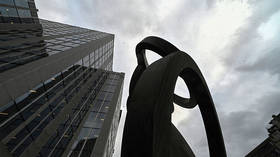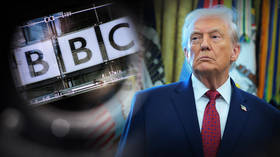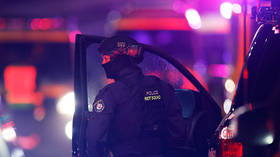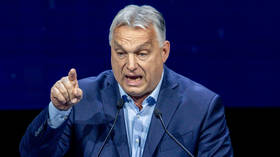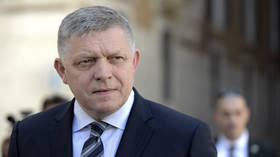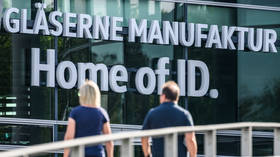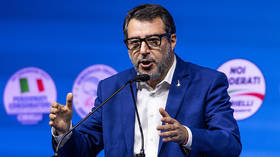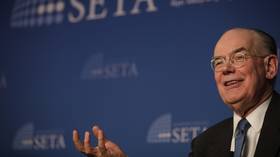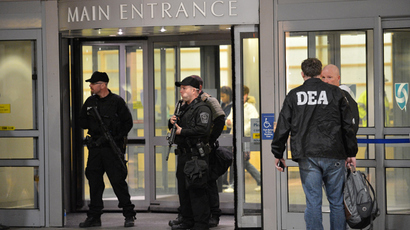'NATO 3' found not guilty of terrorism charges

Defendants in the ‘NATO 3’ trial were found not guilty of terrorism charges on Thursday. The three young men, accused by the state of Illinois of plotting violent acts at the 2012 NATO summit in Chicago, were found guilty on two counts of mob action.
Brian Jacob Church, Brent Betterly and Jared Chase were acquitted of charges including material support for terrorism and conspiracy to commit terrorism.
The defendants were found guilty of two much lesser mob action charges and one count each for possessing an incendiary device to commit arson, which carries the possibility of up to 30 years in prison.
After nearly three weeks of trial proceedings, the jury in the case deliberated for just under eight hours before the verdict was read at around 16:15 CST. Closing arguments lasted around five hours on Thursday.
Illinois state prosecutors and attorneys for the defense said the verdict in the trial would create a clear line between terrorism and violence. In addition, throughout the case, the defense showed how much the supposed plot to use molotov cocktails in Chicago during the 2012 NATO meeting was shepherded by law enforcement, highlighting increased counter-terrorism operations by police in the US that critics say border on entrapment. The defense also warned that dissent should not be conflated with terrorism.
“When your hatred boils over into plots of violence, you've crossed the line — the line that protects us all,” said Assistant State's Attorney John Blakey before jurors on Thursday.
“Is this what the war on terror has come to?” asked attorney Molly Armour, who represents Betterly.
Bond was revoked for all three defendants, the Chicago Sun-Times reported.
Betterly, 25, Chase, 29, and Church, 22, all of Florida, were arrested two days before the beginning of the NATO summit, in May 2012, for alleged involvement in making Molotov cocktails using four empty beer bottles, gasoline and an undercover police officer’s bandana.
Using recordings from two undercover Chicago police officers, the prosecution alleged that the three men made the explosives with the intent to use them during protests that week.
The defense consistently countered those claims, saying the recordings, in fact, did not prove intent, and that the prosecution was severely overreaching with the use of terrorism charges, which are rare on the state level.
In addition to the NATO summit, the defendants were accused of plotting to damage President Barack Obama’s Chicago headquarters, Mayor Rahm Emanuel’s home, police precinct stations and one downtown bank.
Prosecutors highlighted certain statements picked up in recordings, including Church’s question to one of the undercover officers during the creation of the Molotovs, “ready to see a police officer on fire?” Church also said at one point that “the city doesn’t know what it’s in for and after NATO it will never be the same.”
For Thursday’s closing comments to jurors, Blakey even gave the three defendants nicknames - Church was “Mr. Cop-on-Fire,” Chase was “Captain Napalm” and Betterly “Professor Molotov” - claiming they were hiding violent actions “behind the legacy of nonviolent protest,” invoking figures like Martin Luther King, Ghandi and Mother Teresa.
“Many reasons to be proud of being an American,” Blakey said, despite the fact that the prosecution entered as evidence statements the defense said were unrelated to the evidence in the case. “You can speak your mind in America,” he added.
Blakey insisted the trio crossed the line into terrorism when they took their discontent with society into planning violent action. He insisted to jurors the three men were not joking about resorting to violence.
The defense said the clandestine recordings showed the three were often stoned, drunk or plainly too obtuse to be terrorists. They said the two undercover cops, Nadia Chikko and Mehmet Uygun, consistently passed alcohol onto the defendants and enthusiastically encouraged them to build the Molotovs in an effort to find a scapegoat after months of sifting through activist groups searching for potential criminal plots.
Chase’s attorney, Thomas Durkin, even took to mocking what the prosecution called tools the three possessed that could be used for terrorism - knives, a sword, a sling shot, a bow and arrow and a throwing star that Church brought to Chicago in a guitar case. Durkin held up the “rinky dink” sling shot in the courtroom Thursday, drawing laughs from those present.
“Tool of the terrorism trade for sure.” he said, adding, “Give me a break.”
The defense insisted that the pursuit of terror charges against the trio belittled actual operations done by authorities on terrorist networks.
“To me it trivializes terrorism — the most serious type of case,” said Michael Deutsch, Church’s attorney. “You think of Al-Qaeda or the people who blew up Oklahoma City. This is not a case of terrorism.”
The defendants are due to appear in court on Feb. 28 for a sentencing hearing.
At a post-verdict press conference, the defense attorneys called Thursday a big loss for the state, saying Illinois prosecutors should answer for bring a politically-motivated case, according to FireDogLake’s Kevin Gosztola.
The jurors in the case have reportedly expressed disinterest in divulging much of their decision process. "We don't ever ever want to speak to the media,” they expressed, according to DNAinfo.com’s Chicago courts reporter Erin Meyer.


